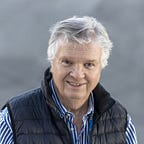What is COVID-19 Doing to the Hug?
Red Cross Boss Visited Italy’s Coronavirus Frontline
When the president of the International Red Cross societies visited the hardest-hit frontline of the COVID-19 pandemic in Italy’s Lombardy region for a recent field visit, he was struck by the absence of one of the most human of touches — the hug.
Francesco Rocca spoke to reporters in Geneva via videoconference recently from Milan, Italy, after he made a field visit to the region that has borne the brunt of Italy’s terrifying encounter with the silent enemy engulfing the world.
It was doubly hard for Rocca, the president of the Geneva-based International Federation of the Red Cross and Red Crescent, as he is Italian, and he is also president of Italy’s Red Cross society.
“What we are missing — and I don’t want to be emotional, but it’s the hug,” said the lawyer who heads the IFRC and was once a fighter against organized crime.
It was not the regular fare for journalists of the UN press corps in Geneva at a press briefing, virtual this time, and where those briefings usually are talking about, concepts such as resourcing capacity and upscaling. This time the focus was the hug.
Hugging has been proven to have health benefits with research showing that hugs increase levels of oxytocin and reduce blood pressure.
In Europe, they kiss on the cheeks and hug. People hug in North America and many other countries such as South Africa where I spent so much of my life, hugging is common and, of course in Italy.
Rocca poignantly spoke about hugging after he was in one place in Lombardy at the end of last week when a volunteer who was working there came up to say something to him.
Could not hug dying mother
“He said you know what Franceso, I lost my mother this morning…I could not hug her, she was crying desperately,” said Rocca.
“She was crying in front of me two meters (six feet) away. It is not possible to mourn her…And she’s gone.”
On the hug, Rocca added, “We are missing this, and we are going to be missing it all over the world….. We grew up hugging our mothers and fathers. When we pass through terrible experiences, when we mourn something, even when we pass through terrible experiences of the past, like earthquakes, but even in the conflict areas, we can hug each other if we are afraid.
“The terrible thing of this is the lack of the human touch, day, the physical human touch. And this is why it is so important in psycho-social security.”
As a late starting father living in Switzerland, I was recommended by a doctor to keep a physical distance from my ten-year-old daughter and have not hugged her for two weeks, not even on my birthday last week.
I know the hug will come back, but the keyword is the most uttered current word — when?
Rocca spoke also about the general effects of the novel coronavirus on life in the north of Italy.
“Unfortunately, everything is focused on the COVID-19, so even the cardio-surgeons are working in the war for COVID- 19. Think about the physiotherapist, the physiotherapist, in the hospital in Bergamo, now he is dedicated to treating the dead bodies, so we are reinventing ourselves.”
He also spoke about some of the other consequences of the response to this unprecedented attack on global humanity stemming from the novel coronavirus happening in Italy, which people will be watching as a warning for their own patch of the world.
Effect on the marginalized
“We have a lot of people who are living very marginalized in the so-called black hole of the society with daily jobs, or other ways to live. In the most difficult neighborhood of the biggest cities,” said Rocca.
“I am afraid that in a few weeks we will have social problems, this is a social bomb that can explode in every moment. Because they don’t have any way to have an income or to find an income.
“People that normally live with 20–25 euros ($22–27.5) per day, with this little job on a daily basis, and maybe they have two children or a family, and they have no income at this moment and they are not in the system of social assistance.”
Health worker’s stresses
In his faltering voice, Rocca also addressed the outcome of the stresses health workers have faced at the Italian frontline.
“We opened a different telephone line to support the health workers because they are dealing with something unprecedented. They are experiencing something that they have never seen, and they will succumb.
“Think about again what could happen in a vulnerable country, so we are supporting the health workers, we are supporting those who are isolated,” said Rocca.
“We are experiencing that the risk of suicide is increasing with isolating people. Those who are drug-addicted now are using alcohol, and this is something that we have a lot of evidence of. So, psycho-social support is something badly needed to support our communities.”
On 2 April, Italy had more than 110,000 confirmed cases of the novel coronavirus that had killed more than 13,000 people in the country. The world had nearly one million cases and almost 48,000 people killed by the disease while nearly 196,000 people had recovered, according to the Johns Hopkins University Coronavirus Resource Center.
“This virus, which was unknown to us three months ago, has exposed the weaknesses and inequities in our health systems and societies, our lack of preparedness, and the gaps in our supply chains and other essential systems,” Tedros Adhanom Ghebreyesus the Director-General of the World Health Organization said at a press conference on 1 April, which no journalists attended.
